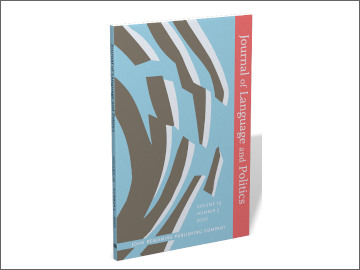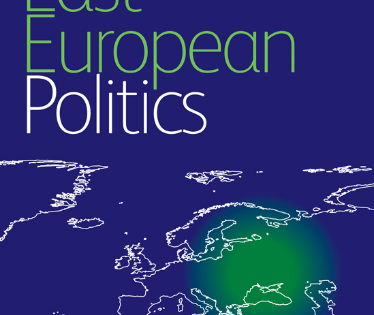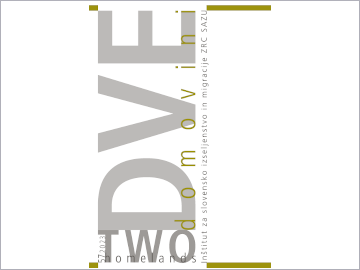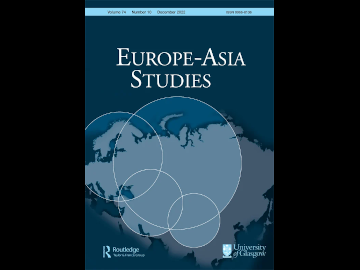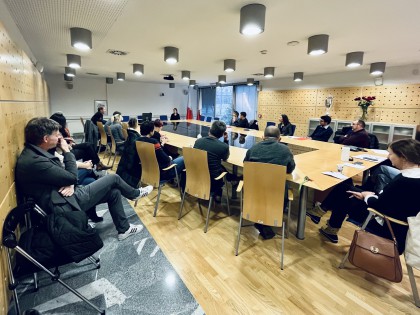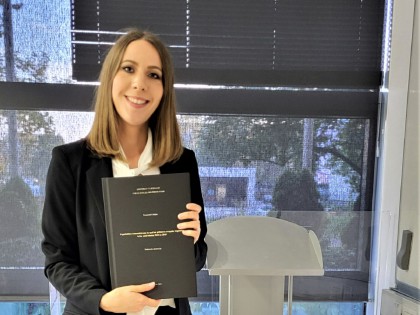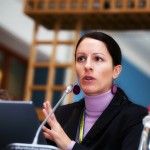The growing number of refugees fleeing to European countries along the Balkan route from war torn and economically devastated zones mainly in the Middle East fuelled the populist upsurge across Europe, including Slovenia and Austria, as refugees were increasingly regarded as dangerous, culturally deviant and as a threat to the national security and the welfare system.
Article: Aligning populist worldviews of citizens to media preferences: peculiarities of an illiberal political context, 6. 3. 2023
In this article the authors look at how people’s relations to the media shape their anti-establishment, people-centrist and exclusionist populist worldviews.
Legislative and Judicial Responses to the “Refugee Crisis” in Slovenia and Austria: A Comparative Perspective, 24. 2. 2023
In the last issue of the journal ‘Dve domovini/Two Homelands’, Neža Kogovšek Šalamon compares the key normative approaches to responses to the 2015–2016 “refugee crisis” in Slovenia and Austria.
The Transversal Political Logic of Populism: Framing the ‘Refugee Crisis’ in Slovenian Parliamentary Debates, 4. 1. 2023
Approaching populism at the intersection of ideology and discourse, in the article the authors Mojca Pajnik and Emanuela Fabijan analyse how politicians in Slovenia responded to migration during and after the ‘refugee crisis’ (2015–2019).
Publication in Media and Communication, 9. 12. 2022
Daniel Thiele and Tjaša Turnšek published an article How Right-Wing Populist Comments Affect Online Deliberation on News Media Facebook Pages in the scientific journal Media and Communication: Online Communities and Populism, which is based on an analysis of Facebook comments in Austria and Slovenia
Mojca Pajnik was elected full professor, 1. 12. 2022
We are proud to announce that our colleague Mojca Pajnik was elected full professor. In her lecture entitled “Transformations of the media: opportunity structures for authoritarian populism” she analysed how technological changes, processes of deregulation, digitalization and plaformization of media together with the consolidation of the precarious model of journalism contribute to vulnerability of media to amplify authoritarian populism.
Emanuela Fabijan, the New PhD, 11. 10. 2022
Emanuela Fabijan defended her PhD thesis (under the mentorship of Mojca Pajnik) from communications at the Faculty of Social Sciences, University of Ljubljana entitled »Populist Communication and Gender in the Case of the European Refugee Crisis from 2015 to 2018«. Sincere congratulations for this achievement!
Right-wing populist affective governing: framing of migration in Austria, 8. 6. 2022
Journal Patterns of Prejudice has published an article by Daniel Thiele, Birgit Sauer and Otto Penz, three of our research colleagues and collaborators on the project POPMED.
The Intertwining of the Covid-19 Pandemic with Democracy Backlash: Making Sense of Journalism in Crisis, 3. 6. 2022
Mojca Pajnik and Majda Hrženjak published the article entitled The Intertwining of the Covid-19 Pandemic with Democracy Backlash: Making Sense of Journalism in Crisis in Journalism Practice.
Populism, authoritarianism and uncivil online public sphere, 30. 5. 2022
Consortium meeting of the POPMED research project in Izola.
Political and media populism in television political interviews, 1. 2. 2022
The article titled ‘Political and media populism in television political interview’ by Emanuela Fabijan and Marko Ribać was published in the latest issue of Družboslovne razprave journal.
Media Populism and Affective Journalism: Newspaper Commentary on the Refugee Crisis, 23. 12. 2021
The article examines the production and reproduction of populism in the media reporting and interpretation of migration in the period of transformative changes of the migration and refugee legislation in Slovenia (2015–2019).
Lance Bennett on Disrupted Public Spheres and Media in Times of Authoritarian Populism, 11. 10. 2021
Lance Bennett delivered his keynote speech providing a valuable closure of the International Conference titled ‘After the summer of migration: right-wing populism, media and affect’.
International conference ‘After the summer of migration: right-wing populism, media and affect’, 20. 9. 2021
As part of the POPMED research we’ve organized an international conference ‘After the summer of migration: right-wing populism, media and affect’ that took place in Ljubljana, September 16-17.
Report on the attitudes of citizens on migration and populism in Austria and Slovenia, 24. 8. 2021
The report synthesizes citizens’ attitudes with previous findings on populism in the political and media field.
The book ‘Populist Spirits of the Times and Challenges to Democracy. Studies on Populism’, 19. 5. 2021
The book includes a chapter by Mojca Pajnik and Iztok Šori on ethno-national populism in the Slovenian context.
Lecture on populism and the normalization of right-wing populist communication in times of crisis, 17.5.2021
The event questions the general conditions of the flourishing of right-wing populist discourse and focuses on the intertwining of affects, various crises, and the media.
After the “Summer Of Migration”: Right-Wing Populism, Media and Affects, 13.4.2021
The invitation for participation in international conference and call for papers.
Conceptualizing populism for migration research, 26. 1. 2021
Mojca Pajnik presented a paper entitled ‘Conceptualizing populism for migration research: towards communicative ethno-national populism’ at the ESA conference.
Populism, masculinities and gender relations, 8. 12. 2020
Dr. Birgit Sauer recently published a chapter where she explains that the rise and strategy of right-wing populist actors is to re-signify the transformation of of gender relations as a „crisis of masculinity“.
Emotional right-wing populism in Austrian parliamentary debates, 1. 12. 2020
POPMED results on emotional right-wing populist discourses in Austrian parliamentary debates were presented at two online conferences.
Collection of scientific papers ‘Social Inequality and Politics’, 1. 12. 2020
Papers that we have presented at the Slovenian Sociological Association in November 2020 are now available online. You’re invited to read them.
Populism at the intersections of civilizationist and securitarian political discourses, 9.11.2020
At our online project meeting we mostly focused to conceptualize and understand the similarities and differences of our findings so far in the two states.
Populism and affective governmentality, 6. 11. 2020
At a sociological meeting taking place online we presented the results of a survey on populism, the media and migration.
Commenting migration on social media, 9. 10. 2020
Currently in POPMED project we are interested in how Facebook users react to media coverage of migration and the “refugee crisis”.
Analyses of the international project Political and Media Populism: “Refugee Crisis” in Slovenia and Austria from the (dis)comfort of the living room, 28. 8. 2020
The 14th General Conference of the European Consortium has moved online due to the Covid-19 pandemic.
Populism and public opinion on migration, 8. 7. 2020
At the recent meeting of the research group we have set up a research model to study the impact of populist politics and media on the formation of public opinion on migration.
Populism and TV production, 10. 6. 2020
At the meeting of the research team we tested the methodology used to study party and media populism in the case of reporting on migration on television.
Reports on the media system and civil society in Slovenia published by POPMED researcher, 12.5.2020
Marko Ribać, researcher analysing populism in the POPMED project, published empirical findings of the ongoing research in two reports.
The book ‘Right-Wing Populism and Gender’, 11. 5. 2020
The book examines how extremist populist actors mobilize gender as a meta-discourse, a strategic tool for achieving particular political objectives.
Book on Governing Affects (12. 2. 2020)
Researchers at the POPMED project Otto Penz and Birgit Sauer published a book with Routledge entitled Governing Affects.
Populism through and by the media (12. 2. 2020)
The media react in various ways to populism of political parties and their leaders; they decide when and why news is worth publishing.
Securitization of migration (17. 12. 2019)
Mojca Pajnik in the interview for he project New Neighbours.
‘Slovenia, an international subject’: political and media populism (5. 11. 2019)
Iztok Šori and Emanuela Fabijan participated in a conversation on populism at the seminar of the Progressive academy entitled ‘Slovenia, an international subject’.
“Chameleonic populism” (20. 9. 2019)
The first findings of the analysis of populist speech in the case of parliamentary debates on seven laws related to migration in 2015-2019 in Slovenia have pointed to the dominant discursive frames that represent migration as a (security) threat, and sees its solutions in militarization and border protection.
Populism and emotional communication (10. 9. 2019)
Two team members of POP-MED project attended the ECPR (European Consortium for Political Research) conference that took place in Wroclaw in Poland, September 3-7, 2019.
Normalizing the Extreme Right (4. 7. 2019)
“From the most obvious case of the Trump presidency in the US and the success of right-wing populist parties in Europe to the election successes of right-wing extremists and populists in Brazil or in India, there is a worldwide trend to construct homogeneous peoples at the danger of disregarding – and often threatening in word and deed – democratic principles such as plurality, equality, and human rights.”
Populism intersecting politics and media (20. 6. 2019)
How to understand populism in contemporary party democracy, how it intersects the political and the media field, what are similarities and differences in manifestations of populism in Slovenia and Austria around migration and migration policy?
On dimensions of populism in Maribor (17. 5. 2019)
Researchers of the Political and media populism: »refugee crisis« in Slovenia and Austria research project at the Faculty of Arts in Maribor.
Discussion on populism and the upcoming European parliament elections (17. 4. 2019)
Cinema Europe in Zagreb hosted a discussion on April 15, 2019 on populism in the context of the up-coming European elections. The speakers included Mojca Pajnik from the Peace Institute, Berto Šalaj from the University of Zagreb and Anna Krasteva from New Bulgarian University.
The kick-off meeting (5. 1. 2019)
We have defined basic concepts and operationalized the research design for this three-year research endeavor.
About the project
![]()
This research investigates the nexus between political parties, media and populism with regard to the so-called “refugee crisis” (2015-2016 until today) in two countries at the central-north end of the Balkan route, i.e. Slovenia and Austria. Conceptual and historical background of the project is the erosion of “party democracy” and the rise of “populist democracy” with classical political leadership declining, coupled with the rising far-right political forces that mobilize against “the other”. The growing number of refugees fleeing to European countries along the Balkan route from war torn and economically devastated zones mainly in the Middle East fuelled the populist upsurge across Europe, including Slovenia and Austria, as refugees were increasingly regarded as dangerous, culturally deviant and as a threat to the national security and the welfare system. In this context the “exclusionary populism” that proposes cultural and religious difference as the rationale for excluding those who do not belong to “the nation” has found its ground to flourish.
The research project proposes a novel analysis of “political-media populism” based on our previous research on media and internet populism (Pajnik and Sauer 2017). It encompasses the analysis of a) trends in politics and the policy making, b) trends in the media and journalism, and c) the related public perception on migration in comparative perspective. The project focuses on the populist production of “politics of fear and securitization” which addresses the emotions and affects of people and converts fear of social and economic decline into anger and hate against migrants. The dynamic interplay between political strategies and media representations – the “media-political parallelism” – is of central concern, i.e. how discourses in the legal, policy and journalistic field are reflected in public opinion and become common sense.
The research contributes to the development of science by devising an innovative approach to research “exclusionary populism” combining a) interdisciplinary b) scale-sensitive, c) policy tracing and framing, and d) comparative epistemological approach, together with mixed methods approach. The project adds the important but hitherto lacking media dimension to the growing debate on populism, it incorporates a new emotional and affective theoretical perspective into rather rationalist argumentations on populism, and it focuses on the currently most prominent issue of right-wing populist exclusion: the othering of migrants. By bringing new theoretical and empirical knowledge the project is expected to impact research in the fields of political science and communication science, in particular studies on populism, media and politics, emotion and politics, but also more generally, on studies of democracy and democratic inclusion/exclusion.
Project team
Peace institute
University of Vienna
Project coordinator
Peace institute
Institute for Contemporary Social and Political Studies
Metelkova 6, 1000 Ljubljana
Phone: +386 1 234 77 20
Fax: +386 1 234 77 22
E-mail: info@mirovni-institut.si
Contact:
Mojca Pajnik
mojca.pajnik@mirovni-institut.si
Birgit Sauer
birgit.sauer@univie.ac.at
The project website was created with the financial support of the Slovenian Research Agency. The content of the website is the responsibility of the Peace institute, and it is by no means considered to reflect the views of the Slovenian Research Agency and the FWF Austrian Science Fund.
